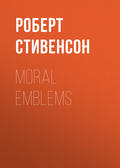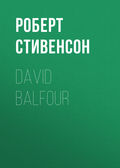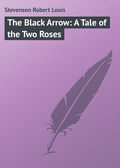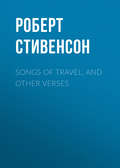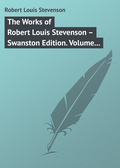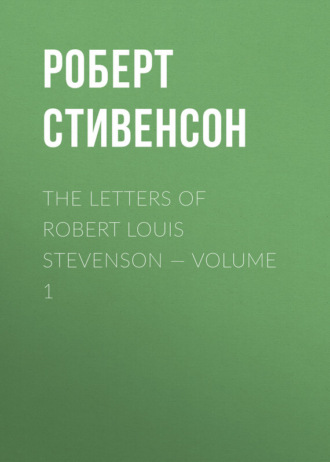
Роберт Льюис Стивенсон
The Letters of Robert Louis Stevenson — Volume 1
However, my long sleep, troubled as it was, put me all right again, and I was able to work acceptably this morning and be very jolly all day. This evening I have had a great deal of talk with both the Russian ladies; they talked very nicely, and are bright, likable women both. They come from Georgia.
WEDNESDAY, 10.30. — We have all been to tea to-night at the Russians' villa. Tea was made out of a samovar, which is something like a small steam engine, and whose principal advantage is that it burns the fingers of all who lay their profane touch upon it. After tea Madame Z. played Russian airs, very plaintive and pretty; so the evening was Muscovite from beginning to end. Madame G.'s daughter danced a tarantella, which was very pretty.
Whenever Nelitchka cries — and she never cries except from pain — all that one has to do is to start 'Malbrook s'en va-t-en guerre.' She cannot resist the attraction; she is drawn through her sobs into the air; and in a moment there is Nelly singing, with the glad look that comes into her face always when she sings, and all the tears and pain forgotten.
It is wonderful, before I shut this up, how that child remains ever interesting to me. Nothing can stale her infinite variety; and yet it is not very various. You see her thinking what she is to do or to say next, with a funny grave air of reserve, and then the face breaks up into a smile, and it is probably 'Berecchino!' said with that sudden little jump of the voice that one knows in children, as the escape of a jack-in-the-box, and, somehow, I am quite happy after that!
R. L. S.
Letter: TO MRS. SITWELL
[MENTONE, JANUARY 1874.]
.. LAST night I had a quarrel with the American on politics. It is odd how it irritates you to hear certain political statements made. He was excited, and he began suddenly to abuse our conduct to America. I, of course, admitted right and left that we had behaved disgracefully (as we had); until somehow I got tired of turning alternate cheeks and getting duly buffeted; and when he said that the Alabama money had not wiped out the injury, I suggested, in language (I remember) of admirable directness and force, that it was a pity they had taken the money in that case. He lost his temper at once, and cried out that his dearest wish was a war with England; whereupon I also lost my temper, and, thundering at the pitch of my voice, I left him and went away by myself to another part of the garden. A very tender reconciliation took place, and I think there will come no more harm out of it. We are both of us nervous people, and he had had a very long walk and a good deal of beer at dinner: that explains the scene a little. But I regret having employed so much of the voice with which I have been endowed, as I fear every person in the hotel was taken into confidence as to my sentiments, just at the very juncture when neither the sentiments nor (perhaps) the language had been sufficiently considered.
FRIDAY. — You have not yet heard of my book? — FOUR GREAT SCOTSMEN — John Knox, David Hume, Robert Burns, Walter Scott. These, their lives, their work, the social media in which they lived and worked, with, if I can so make it, the strong current of the race making itself felt underneath and throughout — this is my idea. You must tell me what you think of it. The Knox will really be new matter, as his life hitherto has been disgracefully written, and the events are romantic and rapid; the character very strong, salient, and worthy; much interest as to the future of Scotland, and as to that part of him which was truly modern under his Hebrew disguise. Hume, of course, the urbane, cheerful, gentlemanly, letter-writing eighteenth century, full of attraction, and much that I don't yet know as to his work. Burns, the sentimental side that there is in most Scotsmen, his poor troubled existence, how far his poems were his personally, and how far national, the question of the framework of society in Scotland, and its fatal effect upon the finest natures. Scott again, the ever delightful man, sane, courageous, admirable; the birth of Romance, in a dawn that was a sunset; snobbery, conservatism, the wrong thread in History, and notably in that of his own land. VOILA, MADAME, LE MENU. COMMENT LE TROUVEZ- VOUS? IL Y A DE LA BONNE VIANDO, SI ON PARVIENT A LA CUIRE CONVENABLEMENT.
R. L. S.
Letter: TO MRS. THOMAS STEVENSON
[MENTONE, MARCH 28, 1874.]
MY DEAR MOTHER, — Beautiful weather, perfect weather; sun, pleasant cooling winds; health very good; only incapacity to write.
The only new cloud on my horizon (I mean this in no menacing sense) is the Prince. I have philosophical and artistic discussions with the Prince. He is capable of talking for two hours upon end, developing his theory of everything under Heaven from his first position, which is that there is no straight line. Doesn't that sound like a game of my father's — I beg your pardon, you haven't read it — I don't mean MY father, I mean Tristram Shandy's. He is very clever, and it is an immense joke to hear him unrolling all the problems of life — philosophy, science, what you will — in this charmingly cut-and-dry, here-we-are-again kind of manner. He is better to listen to than to argue withal. When you differ from him, he lifts up his voice and thunders; and you know that the thunder of an excited foreigner often miscarries. One stands aghast, marvelling how such a colossus of a man, in such a great commotion of spirit, can open his mouth so much and emit such a still small voice at the hinder end of it all. All this while he walks about the room, smokes cigarettes, occupies divers chairs for divers brief spaces, and casts his huge arms to the four winds like the sails of a mill. He is a most sportive Prince.
R. L. S.
Letter: TO MRS. SITWELL
[SWANSTON], MAY 1874, MONDAY
WE are now at Swanston Cottage, Lothianburn, Edinburgh. The garden is but little clothed yet, for, you know, here we are six hundred feet above the sea. It is very cold, and has sleeted this morning. Everything wintry. I am very jolly, however, having finished Victor Hugo, and just looking round to see what I should next take up. I have been reading Roman Law and Calvin this morning.
EVENING. — I went up the hill a little this afternoon. The air was invigorating, but it was so cold that my scalp was sore. With this high wintry wind, and the grey sky, and faint northern daylight, it was quite wonderful to hear such a clamour of blackbirds coming up to me out of the woods, and the bleating of sheep being shorn in a field near the garden, and to see golden patches of blossom already on the furze, and delicate green shoots upright and beginning to frond out, among last year's russet bracken. Flights of crows were passing continually between the wintry leaden sky and the wintry cold-looking hills. It was the oddest conflict of seasons. A wee rabbit — this year's making, beyond question — ran out from under my feet, and was in a pretty perturbation, until he hit upon a lucky juniper and blotted himself there promptly. Evidently this gentleman had not had much experience of life.
I have made an arrangement with my people: I am to have 84 pounds a year — I only asked for 80 pounds on mature reflection — and as I should soon make a good bit by my pen, I shall be very comfortable. We are all as jolly as can be together, so that is a great thing gained.
WEDNESDAY. — Yesterday I received a letter that gave me much pleasure from a poor fellow-student of mine, who has been all winter very ill, and seems to be but little better even now. He seems very much pleased with ORDERED SOUTH. 'A month ago,' he says, 'I could scarcely have ventured to read it; to-day I felt on reading it as I did on the first day that I was able to sun myself a little in the open air.' And much more to the like effect. It is very gratifying. — Ever your faithful friend,
ROBERT LOUIS STEVENSON.
Letter: TO MRS. SITWELL
SWANSTON, WEDNESDAY, MAY 1874
STRUGGLING away at FABLES IN SONG. I am much afraid I am going to make a real failure; the time is so short, and I am so out of the humour. Otherwise very calm and jolly: cold still IMPOSSIBLE.
THURSDAY. — I feel happier about the FABLES, and it is warmer a bit; but my body is most decrepit, and I can just manage to be cheery and tread down hypochondria under foot by work. I lead such a funny life, utterly without interest or pleasure outside of my work: nothing, indeed, but work all day long, except a short walk alone on the cold hills, and meals, and a couple of pipes with my father in the evening. It is surprising how it suits me, and how happy I keep.
SATURDAY. — I have received such a nice long letter (four sides) from Leslie Stephen to-day about my Victor Hugo. It is accepted. This ought to have made me gay, but it hasn't. I am not likely to be much of a tonic to-night. I have been very cynical over myself to-day, partly, perhaps, because I have just finished some of the deedest rubbish about Lord Lytton's fables that an intelligent editor ever shot into his wastepaper basket. If Morley prints it I shall be glad, but my respect for him will be shaken.
TUESDAY. — Another cold day; yet I have been along the hillside, wondering much at idiotic sheep, and raising partridges at every second step. One little plover is the object of my firm adherence. I pass his nest every day, and if you saw how he files by me, and almost into my face, crying and flapping his wings, to direct my attention from his little treasure, you would have as kind a heart to him as I. To-day I saw him not, although I took my usual way; and I am afraid that some person has abused his simple wiliness and harried (as we say in Scotland) the nest. I feel much righteous indignation against such imaginary aggressor. However, one must not be too chary of the lower forms. To-day I sat down on a tree- stump at the skirt of a little strip of planting, and thoughtlessly began to dig out the touchwood with an end of twig. I found I had carried ruin, death, and universal consternation into a little community of ants; and this set me a-thinking of how close we are environed with frail lives, so that we can do nothing without spreading havoc over all manner of perishable homes and interests and affections; and so on to my favourite mood of an holy terror for all action and all inaction equally — a sort of shuddering revulsion from the necessary responsibilities of life. We must not be too scrupulous of others, or we shall die. Conscientiousness is a sort of moral opium; an excitant in small doses, perhaps, but at bottom a strong narcotic.
SATURDAY. — I have been two days in Edinburgh, and so had not the occasion to write to you. Morley has accepted the FABLES, and I have seen it in proof, and think less of it than ever. However, of course, I shall send you a copy of the MAGAZINE without fail, and you can be as disappointed as you like, or the reverse if you can. I would willingly recall it if I could.
Try, by way of change, Byron's MAZEPPA; you will be astonished. It is grand and no mistake, and one sees through it a fire, and a passion, and a rapid intuition of genius, that makes one rather sorry for one's own generation of better writers, and — I don't know what to say; I was going to say 'smaller men'; but that's not right; read it, and you will feel what I cannot express. Don't be put out by the beginning; persevere, and you will find yourself thrilled before you are at an end with it. — Ever your faithful friend,
ROBERT LOUIS STEVENSON.
Letter: TO MRS. SITWELL
TRAIN BETWEEN EDINBURGH AND CHESTER, AUGUST 8, 1874
MY father and mother reading. I think I shall talk to you for a moment or two. This morning at Swanston, the birds, poor creatures, had the most troubled hour or two; evidently there was a hawk in the neighbourhood; not one sang; and the whole garden thrilled with little notes of warning and terror. I did not know before that the voice of birds could be so tragically expressive. I had always heard them before express their trivial satisfaction with the blue sky and the return of daylight. Really, they almost frightened me; I could hear mothers and wives in terror for those who were dear to them; it was easy to translate, I wish it were as easy to write; but it is very hard in this flying train, or I would write you more.
CHESTER. — I like this place much; but somehow I feel glad when I get among the quiet eighteenth century buildings, in cosy places with some elbow room about them, after the older architecture. This other is bedevilled and furtive; it seems to stoop; I am afraid of trap-doors, and could not go pleasantly into such houses. I don't know how much of this is legitimately the effect of the architecture; little enough possibly; possibly far the most part of it comes from bad historical novels and the disquieting statuary that garnishes some facades.
On the way, to-day, I passed through my dear Cumberland country. Nowhere to as great a degree can one find the combination of lowland and highland beauties; the outline of the blue hills is broken by the outline of many tumultuous tree-clumps; and the broad spaces of moorland are balanced by a network of deep hedgerows that might rival Suffolk, in the foreground. — How a railway journey shakes and discomposes one, mind and body! I grow blacker and blacker in humour as the day goes on; and when at last I am let out, and have the fresh air about me, it is as though I were born again, and the sick fancies flee away from my mind like swans in spring.
I want to come back on what I have said about eighteenth century and middle-age houses: I do not know if I have yet explained to you the sort of loyalty, of urbanity, that there is about the one to my mind; the spirit of a country orderly and prosperous, a flavour of the presence of magistrates and well-to-do merchants in bag-wigs, the clink of glasses at night in fire-lit parlours, something certain and civic and domestic, is all about these quiet, staid, shapely houses, with no character but their exceeding shapeliness, and the comely external utterance that they make of their internal comfort. Now the others are, as I have said, both furtive and bedevilled; they are sly and grotesque; they combine their sort of feverish grandeur with their sort of secretive baseness, after the manner of a Charles the Ninth. They are peopled for me with persons of the same fashion. Dwarfs and sinister people in cloaks are about them; and I seem to divine crypts, and, as I said, trap-doors. O God be praised that we live in this good daylight and this good peace.
BARMOUTH, AUGUST 9TH. — To-day we saw the cathedral at Chester; and, far more delightful, saw and heard a certain inimitable verger who took us round. He was full of a certain recondite, far-away humour that did not quite make you laugh at the time, but was somehow laughable to recollect. Moreover, he had so far a just imagination, and could put one in the right humour for seeing an old place, very much as, according to my favourite text, Scott's novels and poems do for one. His account of the monks in the Scriptorium, with their cowls over their heads, in a certain sheltered angle of the cloister where the big Cathedral building kept the sun off the parchments, was all that could be wished; and so too was what he added of the others pacing solemnly behind them and dropping, ever and again, on their knees before a little shrine there is in the wall, 'to keep 'em in the frame of mind.' You will begin to think me unduly biassed in this verger's favour if I go on to tell you his opinion of me. We got into a little side chapel, whence we could hear the choir children at practice, and I stopped a moment listening to them, with, I dare say, a very bright face, for the sound was delightful to me. 'Ah,' says he, 'you're VERY fond of music.' I said I was. 'Yes, I could tell that by your head,' he answered. 'There's a deal in that head.' And he shook his own solemnly. I said it might be so, but I found it hard, at least, to get it out. Then my father cut in brutally, said anyway I had no ear, and left the verger so distressed and shaken in the foundations of his creed that, I hear, he got my father aside afterwards and said he was sure there was something in my face, and wanted to know what it was, if not music. He was relieved when he heard that I occupied myself with litterature (which word, note here, I do not spell correctly). Good-night, and here's the verger's health!
R. L. S.
Letter: TO MRS. SITWELL
SWANSTON, WEDNESDAY, [AUTUMN] 1874
I HAVE been hard at work all yesterday, and besides had to write a long letter to Bob, so I found no time until quite late, and then was sleepy. Last night it blew a fearful gale; I was kept awake about a couple of hours, and could not get to sleep for the horror of the wind's noise; the whole house shook; and, mind you, our house IS a house, a great castle of jointed stone that would weigh up a street of English houses; so that when it quakes, as it did last night, it means something. But the quaking was not what put me about; it was the horrible howl of the wind round the corner; the audible haunting of an incarnate anger about the house; the evil spirit that was abroad; and, above all, the shuddering silent pauses when the storm's heart stands dreadfully still for a moment. O how I hate a storm at night! They have been a great influence in my life, I am sure; for I can remember them so far back — long before I was six at least, for we left the house in which I remember listening to them times without number when I was six. And in those days the storm had for me a perfect impersonation, as durable and unvarying as any heathen deity. I always heard it, as a horseman riding past with his cloak about his head, and somehow always carried away, and riding past again, and being baffled yet once more, AD INFINITUM, all night long. I think I wanted him to get past, but I am not sure; I know only that I had some interest either for or against in the matter; and I used to lie and hold my breath, not quite frightened, but in a state of miserable exaltation.
My first John Knox is in proof, and my second is on the anvil. It is very good of me so to do; for I want so much to get to my real tour and my sham tour, the real tour first: it is always working in my head, and if I can only turn on the right sort of style at the right moment, I am not much afraid of it. One thing bothers me; what with hammering at this J. K., and writing necessary letters, and taking necessary exercise (that even not enough, the weather is so repulsive to me, cold and windy), I find I have no time for reading except times of fatigue, when I wish merely to relax myself. O — and I read over again for this purpose Flaubert's TENTATION DE ST. ANTOINE; it struck me a good deal at first, but this second time it has fetched me immensely. I am but just done with it, so you will know the large proportion of salt to take with my present statement, that it's the finest thing I ever read! Of course, it isn't that, it's full of LONGUEURS, and is not quite 'redd up,' as we say in Scotland, not quite articulated; but there are splendid things in it.
I say, DO take your maccaroni with oil: DO, PLEASE. It's BEASTLY with butter. — Ever your faithful friend,
ROBERT LOUIS STEVENSON.
Letter: TO MRS. SITWELL
[EDINBURGH], DECEMBER 23, 1874
MONDAY. — I have come from a concert, and the concert was rather a disappointment. Not so my afternoon skating — Duddingston, our big loch, is bearing; and I wish you could have seen it this afternoon, covered with people, in thin driving snow flurries, the big hill grim and white and alpine overhead in the thick air, and the road up the gorge, as it were into the heart of it, dotted black with traffic. Moreover, I CAN skate a little bit; and what one can do is always pleasant to do.
TUESDAY. — I got your letter to-day, and was so glad thereof. It was of good omen to me also. I worked from ten to one (my classes are suspended now for Xmas holidays), and wrote four or five Portfolio pages of my Buckinghamshire affair. Then I went to Duddingston and skated all afternoon. If you had seen the moon rising, a perfect sphere of smoky gold, in the dark air above the trees, and the white loch thick with skaters, and the great hill, snow-sprinkled, overhead! It was a sight for a king.
WEDNESDAY. — I stayed on Duddingston to-day till after nightfall. The little booths that hucksters set up round the edge were marked each one by its little lamp. There were some fires too; and the light, and the shadows of the people who stood round them to warm themselves, made a strange pattern all round on the snow-covered ice. A few people with torches began to travel up and down the ice, a lit circle travelling along with them over the snow. A gigantic moon rose, meanwhile, over the trees and the kirk on the promontory, among perturbed and vacillating clouds.
The walk home was very solemn and strange. Once, through a broken gorge, we had a glimpse of a little space of mackerel sky, moon- litten, on the other side of the hill; the broken ridges standing grey and spectral between; and the hilltop over all, snow-white, and strangely magnified in size.
This must go to you to-morrow, so that you may read it on Christmas Day for company. I hope it may be good company to you.
THURSDAY. — Outside, it snows thick and steadily. The gardens before our house are now a wonderful fairy forest. And O, this whiteness of things, how I love it, how it sends the blood about my body! Maurice de Guerin hated snow; what a fool he must have been! Somebody tried to put me out of conceit with it by saying that people were lost in it. As if people don't get lost in love, too, and die of devotion to art; as if everything worth were not an occasion to some people's end.
What a wintry letter this is! Only I think it is winter seen from the inside of a warm greatcoat. And there is, at least, a warm heart about it somewhere. Do you know, what they say in Xmas stories is true? I think one loves their friends more dearly at this season. — Ever your faithful friend,
ROBERT LOUIS STEVENSON.
Letter: TO SIDNEY COLVIN
17 HERIOT ROAD, EDINBURGH [JANUARY 1875]
MY DEAR COLVIN, — I have worked too hard; I have given myself one day of rest, and that was not enough; I am giving myself another. I shall go to bed again likewise so soon as this is done, and slumber most potently.
9 P.M., slept all afternoon like a lamb.
About my coming south, I think the still small unanswerable voice of coins will make it impossible until the session is over (end of March); but for all that, I think I shall hold out jolly. I do not want you to come and bother yourself; indeed, it is still not quite certain whether my father will be quite fit for you, although I have now no fear of that really. Now don't take up this wrongly; I wish you could come; and I do not know anything that would make me happier, but I see that it is wrong to expect it, and so I resign myself: some time after. I offered Appleton a series of papers on the modern French school — the Parnassiens, I think they call them — de Banville, Coppee, Soulary, and Sully Prudhomme. But he has not deigned to answer my letter.
I shall have another Portfolio paper so soon as I am done with this story, that has played me out; the story is to be called WHEN THE DEVIL WAS WELL: scene, Italy, Renaissance; colour, purely imaginary of course, my own unregenerate idea of what Italy then was. O, when shall I find the story of my dreams, that shall never halt nor wander nor step aside, but go ever before its face, and ever swifter and louder, until the pit receives it, roaring? The Portfolio paper will be about Scotland and England. — Ever yours,
R. L. STEVENSON.
Letter: TO MRS. SITWELL
EDINBURGH, TUESDAY [FEBRUARY 1875]
I GOT your nice long gossiping letter to-day — I mean by that that there was more news in it than usual — and so, of course, I am pretty jolly. I am in the house, however, with such a beastly cold in the head. Our east winds begin already to be very cold.
O, I have such a longing for children of my own; and yet I do not think I could bear it if I had one. I fancy I must feel more like a woman than like a man about that. I sometimes hate the children I see on the street — you know what I mean by hate — wish they were somewhere else, and not there to mock me; and sometimes, again, I don't know how to go by them for the love of them, especially the very wee ones.
THURSDAY. — I have been still in the house since I wrote, and I HAVE worked. I finished the Italian story; not well, but as well as I can just now; I must go all over it again, some time soon, when I feel in the humour to better and perfect it. And now I have taken up an old story, begun years ago; and I have now re-written all I had written of it then, and mean to finish it. What I have lost and gained is odd. As far as regards simple writing, of course, I am in another world now; but in some things, though more clumsy, I seem to have been freer and more plucky: this is a lesson I have taken to heart. I have got a jolly new name for my old story. I am going to call it A COUNTRY DANCE; the two heroes keep changing places, you know; and the chapter where the most of this changing goes on is to be called 'Up the middle, down the middle.' It will be in six, or (perhaps) seven chapters. I have never worked harder in my life than these last four days. If I can only keep it up.
SATURDAY. — Yesterday, Leslie Stephen, who was down here to lecture, called on me and took me up to see a poor fellow, a poet who writes for him, and who has been eighteen months in our infirmary, and may be, for all I know, eighteen months more. It was very sad to see him there, in a little room with two beds, and a couple of sick children in the other bed; a girl came in to visit the children, and played dominoes on the counterpane with them; the gas flared and crackled, the fire burned in a dull economical way; Stephen and I sat on a couple of chairs, and the poor fellow sat up in his bed with his hair and beard all tangled, and talked as cheerfully as if he had been in a King's palace, or the great King's palace of the blue air. He has taught himself two languages since he has been lying there. I shall try to be of use to him.
We have had two beautiful spring days, mild as milk, windy withal, and the sun hot. I dreamed last night I was walking by moonlight round the place where the scene of my story is laid; it was all so quiet and sweet, and the blackbirds were singing as if it was day; it made my heart very cool and happy. — Ever yours,
ROBERT LOUIS STEVENSON.
Letter: TO SIDNEY COLVIN
FEBRUARY 8, 1875
MY DEAR COLVIN, — Forgive my bothering you. Here is the proof of my second KNOX. Glance it over, like a good fellow, and if there's anything very flagrant send it to me marked. I have no confidence in myself; I feel such an ass. What have I been doing? As near as I can calculate, nothing. And yet I have worked all this month from three to five hours a day, that is to say, from one to three hours more than my doctor allows me; positively no result.
No, I can write no article just now; I am PIOCHING, like a madman, at my stories, and can make nothing of them; my simplicity is tame and dull — my passion tinsel, boyish, hysterical. Never mind — ten years hence, if I live, I shall have learned, so help me God. I know one must work, in the meantime (so says Balzac) COMME LE MINEUR ENFOUI SOUS UN EBOULEMENT.
J'Y PARVIENDRAI, NOM DE NOM DE NOM! But it's a long look forward.
— Ever yours,
R. L. S.
Letter: TO MRS. SITWELL
[BARBIZON, APRIL 1875.]
MY DEAR FRIEND, — This is just a line to say I am well and happy. I am here in my dear forest all day in the open air. It is very be — no, not beautiful exactly, just now, but very bright and living. There are one or two song birds and a cuckoo; all the fruit-trees are in flower, and the beeches make sunshine in a shady place, I begin to go all right; you need not be vexed about my health; I really was ill at first, as bad as I have been for nearly a year; but the forest begins to work, and the air, and the sun, and the smell of the pines. If I could stay a month here, I should be as right as possible. Thanks for your letter. — Your faithful
R. L. S.
Letter: TO MRS. SITWELL
17 HERIOT ROW, EDINBURGH, SUNDAY [APRIL 1875]
HERE is my long story: yesterday night, after having supped, I grew so restless that I was obliged to go out in search of some excitement. There was a half-moon lying over on its back, and incredibly bright in the midst of a faint grey sky set with faint stars: a very inartistic moon, that would have damned a picture.
At the most populous place of the city I found a little boy, three years old perhaps, half frantic with terror, and crying to every one for his 'Mammy.' This was about eleven, mark you. People stopped and spoke to him, and then went on, leaving him more frightened than before. But I and a good-humoured mechanic came up together; and I instantly developed a latent faculty for setting the hearts of children at rest. Master Tommy Murphy (such was his name) soon stopped crying, and allowed me to take him up and carry him; and the mechanic and I trudged away along Princes Street to find his parents. I was soon so tired that I had to ask the mechanic to carry the bairn; and you should have seen the puzzled contempt with which he looked at me, for knocking in so soon. He was a good fellow, however, although very impracticable and sentimental; and he soon bethought him that Master Murphy might catch cold after his excitement, so we wrapped him up in my greatcoat. 'Tobauga (Tobago) Street' was the address he gave us; and we deposited him in a little grocer's shop and went through all the houses in the street without being able to find any one of the name of Murphy. Then I set off to the head police office, leaving my greatcoat in pawn about Master Murphy's person. As I went down one of the lowest streets in the town, I saw a little bit of life that struck me. It was now half-past twelve, a little shop stood still half-open, and a boy of four or five years old was walking up and down before it imitating cockcrow. He was the only living creature within sight.



